IRGC General Says US Has Given Up ‘Military Option’ Against Iran
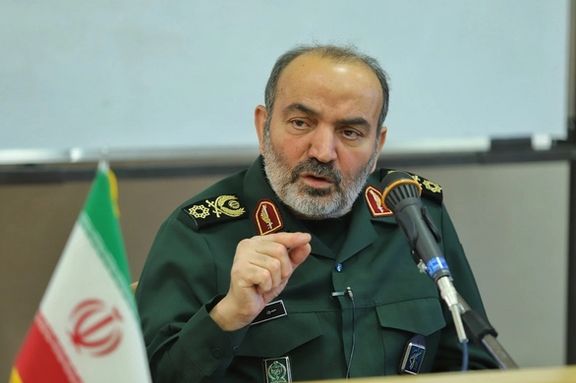
The United States has given up the military option against Iran, a senior Revolutionary Guard official was quoted as saying by local media on Friday.

The United States has given up the military option against Iran, a senior Revolutionary Guard official was quoted as saying by local media on Friday.
Gen. Hossein Daqiqi (Daghighi), top advisor to IRGC’s chief commander, during a speech Thursday evening said that the US not only has given up on the military option but might also relinquish sanctions and economic pressure soon against the Islamic Republic.
“The military option has been taken off the table by the Americans, but economic and cultural pressures are still active, although the economic option is also on its way out,” Daqiqi said, “because they believe that sanctions have not been effective.”
The IRGC official also said that “If a country has all the military hardware in the world, but its leader is a coward like Trump, it won’t be able to accomplish anything.” He added that in contrast, Islamic Republic’s leader Ali Khamenei ordered a missile strike against US bases in Iraq after the killing of IRGC’s Qassem Soleimani in Baghdad by a US air strike.
US President Joe Biden and his senior officials have reiterated several times in recent months that all options are on the table not to allow Tehran to possess nuclear weapons, and they have designated more companies and individuals for violating US sanctions.
Congressional and other critics of President Biden’s Iran policy say the administration has not rigorously implemented oil export sanctions imposed by former President Donald Trump when he withdrew from the JCPOA nuclear deal in 2018.
Iran began to increase clandestine oil shipments to China at the end of 2020 as Biden won the presidential election and signaled his readiness to overturn Trump’s decision and revive the JCPOA.

Tehran is using the Caspian Sea to transfer suspected weapons cargos to Moscow, CNN reported on Friday.
CNN quoted experts as saying that as cooperation between the two countries deepens, the Caspian Sea route is being used to move drones, bullets, and mortar shells that the Russian government has purchased from Iran to use in Ukraine.
“Tracking data shows that vessels in the region are increasingly going dark – suggesting growing intent to obfuscate the movement of goods,” the US news channel claims.
Data from Lloyd's List Intelligence revealed a spike in Caspian vessel tracking gaps in September last year.
The US and Ukrainian governments claim Moscow acquired drones from Tehran last summer. The use of Iranian drones by Russia increased in the fall, including against critical energy infrastructure in Ukraine.
It is unlikely that Ukraine's Western allies could stop such arms deliveries, analysts told CNN.
“There is no risk to Iranian exports in the Caspian Sea because of the bordering countries – they don’t have the capability or motive to interdict in these sorts of exchanges,” said Martin Kelly, lead intelligence analyst at security company EOS Risk Group.
Back in April, The Wall Street Journal reported that Iran has shipped over 300,000 artillery shells and about a million rounds of ammunition to Russia using cargo ships in the Caspian Sea; something that Iran denied saying That Tehran is opposed to war and supports a ceasefire and peace in Ukraine.
Officials in the Middle East had told the WSJ that the last shipment of weapons to Russia crossed the Caspian Sea aboard the 460-foot Russian cargo ship Rasul Gamzatov in early March. The company owning the vessel had already been sanctioned by the US.
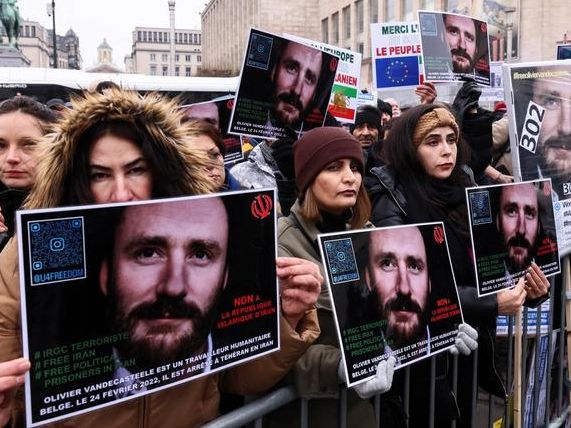
Oman has mediated a long-debated prisoner swap deal between Iran and Belgium to release a convicted Iranian diplomat for a Belgian aid worker taken hostage by Tehran.
Oman’s foreign ministry released a statement on Friday that reads “In compliance with the directives of His Majesty Sultan Haitham bin Tarik, to fulfill the requests of the Iranian and Belgian governments to assist in resolving the issue of detained citizens in both countries, the Omani efforts have resulted in an agreement between the two sides for a mutual exchange deal.”
Without naming the prisoners, the ministry added that the individuals who were released have been transported from Tehran and Brussels to Muscat today, Friday, May 26, 2023, in preparation for their return to their respective countries.
Former diplomat Asadollah Assadi, convicted in plot to bomb an Iranian exiled group event in France, arrived in Tehran on Friday afternoon. Upon arrival, he received a hero's welcome by government spokesman Ali Bahadori Jahromi and Kazem Gharibabadi, the deputy head of the Judiciary who is also secretary of the High Council for Human Rights as well as several other officials.
Earlier in the day, Belgian Prime Minister Alexander De Croo announced in a statement that aid worker Olivier Vandecasteele had been freed and will arrive in Brussels within a few hours.
De Croosaid in a video statement, "If everything goes as planned, he will be with us tonight, finally free," adding that he had undergone medical assessment and was in the care of Belgian military and diplomatic staff.
“Olivier spent 455 days in prison in Tehran. In unbearable conditions. Innocent,” De Croo said, adding: “Olivier Vandecasteele’s return to Belgium is a relief. A relief for his family, friends and colleagues.”

Thanking the Sultanate of Oman for “its positive efforts in this direction,” Iran’s foreign minister Hossein Amir-Abdollahian said in a Persian post on his Twitter account that “Mr. Assadollah Assadi, the innocent diplomat of our country, who was illegally detained in Germany and Belgium for more than two years against international law, is now on his way back to his homeland and will soon enter our beloved Iran.”
Assadi, 50, a former attaché at the Iranian embassy in Austria, was convicted of plotting to bomb a gathering of the exiled opposition group Mujahedin-e Khalq Organization (MEK) near Paris on June 30, 2018. The only Iranian diplomat ever brought to trial in Europe for direct involvement in terrorism was arrested in Germany, where he did not enjoy diplomatic immunity, while he was on holiday. German authorities later extradited Assadi to Belgium.
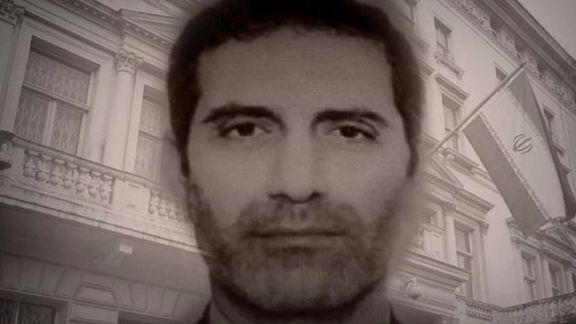
Iran's Foreign Ministry Spokesman Nasser Kanani issued a statement, saying that Assadi will return to the country after "five years in captivity," claiming that Assadi had been "taken hostage" during a plot designed by the Israeli regime and cooperation of some European intelligence services.
"The Zionist-American 'big lie' scenario went on stage with the aim of creating a crisis in relations between Iran and Europe and this plot happened right after the US withdrew from the nuclear deal with Iran," he said.
However, the Islamic Republic has a long history of hostage diplomacy, which started soon after the establishment of the regime with taking hostage American diplomats and embassy staff. UN experts and international human rights organizations say that the Islamic Republic takes foreigners hostage to extract concessions from the West.
The Islamic Republic’s judiciary sentenced Vandecasteele, who was detained in 2022, to 40 years in prison and 74 lashes for alleged “spying and cooperation with the United States, money laundering and smuggling $500,000 out of Iran.”
Vandecasteele, now 42, has served in various international humanitarian organizations since at least 2006, including, Médecins du Monde, Norwegian Refugee Council (NRC), and Relief International. He worked in Iran for humanitarian organizations for more than six years and left the country. Later, he was lured back in a honey trap plot and was detained in February 2022.
The Belgian Parliament ratified a controversial prisoner swap treaty with Iran on July 20, but a temporary ban on the extradition of the convicted diplomat was announced by the Brussels Court of Appeal late in July following numerous complaints. The critics of the accord warned that such a treaty would effectively establish Belgium as a “sanctuary country” for terrorist operations, and a haven for Iranian intelligence services to maintain a European command center.
In March, Belgium's Constitutional Court rejected a request to annul a prisoner exchange treaty with the Islamic Republic paving the ground for the release of the diplomat.
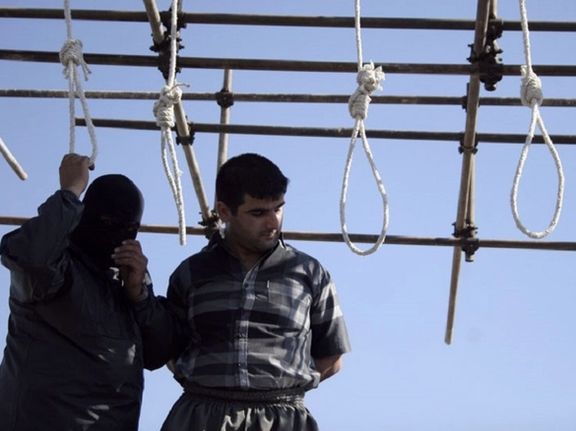
Despite an upsurge in criticism against Iran's renewed hanging spree, Iranian authorities executed a man in public in front of large crowds Thursday, a rights group revealed.
Iran Human Rights (IHR) reported that the man, who was convicted of the capital crime of "corruption on earth" -- a vague Islamic law term interpreted among the highest crimes by the Islamic Republic and punishable by death -- was executed in the city of Maragheh in Eastern Azerbaijan.
“The international community cannot endorse such medieval practices,” said IHR director Mahmood Amiry-Moghaddam, adding the execution shows the “true face of a government that tries to prolong its life with cruelty, humiliation and intimidation of society.”
Iranian news websites showed images of what appeared to be hundreds of people gathered to watch the execution behind a security tape as prosecutors spoke to reporters.
The man was shown blindfolded next to his two executioners in balaclavas. Another image showed him standing on a chair ahead of the execution with the noose around his neck and hanging from a rope attached to a crane once dead.
Although the nature of the alleged crimes was not immediately clear, the convict, who was first arrested some five years ago, was found guilty of charges related to his sexual relations with women.
In Iran, more people are executed each year than in any other country other than China, according to rights groups including Amnesty International, but public executions are relatively rare, with most hangings taking place inside prisons.
There were no public executions in 2021, according to IHR.
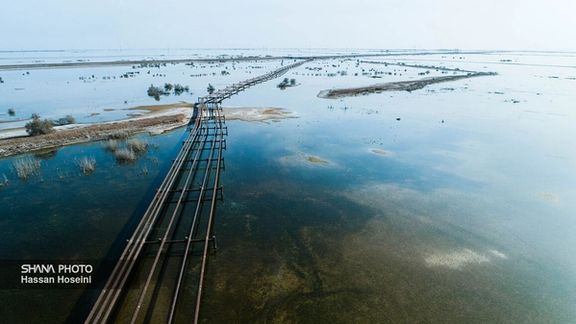
Development of Sohrab Oil Field in Iran's oil-rich southwestern Khuzestan Province has raised serious environmental concerns about the destruction of Hoor al-Azim Marshlands.
Due to ecological hazards, the environmental department of Khuzestan has objected to the implementation of the project. An official of the department, Sirous Karimi, told Etemad newspaper Wednesday that environmental evaluation of the project is ongoing and a permit for development of the field is still pending.
Mohammad Javad Ashrafi, a former director general of Khuzestan’s department of environment, also told Etemad newspaper that he development of the oil field has been put on the agenda due to the policy of giving priority to the development of oil and gas fields shared with Iraq.
According to Ashrafi, the department rejected the construction of 25 platforms and 35 wells as originally proposed by the National Iranian Oil Company (NIOC) which required the draining of fifteen separate locations covering an area of around 30 hectares of marshes.
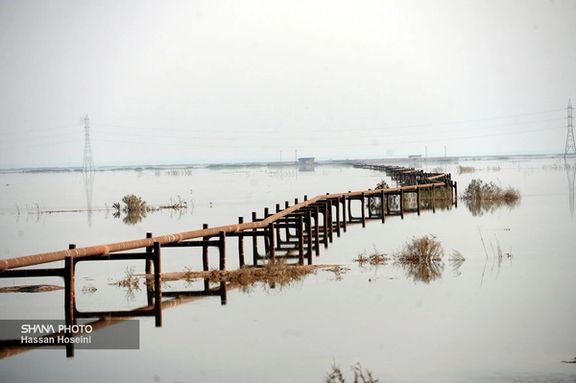
The NIOC then modified its proposal and reduced the locations to six areas of around 3 hectares each which the department has also not accepted, he said.
Hoor al-Azim, part of the complex of Hawizeh marshes that straddle the Iran-Iraq border, is home to several endangered bird species, unique water plants, and fish. Only one-third of the marshes are on the Iranian side of the border. The marshes play a significant role against dust storms that have plagued southwestern provinces of Iran in the past two decades.
Over half of the Iranian part of Hoor al-Azim, once over 60,000 hectares, has dried up since the late 1980s because of draughts, extraction of water for agriculture, construction of roads and dykes, the many dams built on Karkheh River on the Iranian side of the border and the change of Tigris River’s course on the Iraqi side.
Sohrab Oil Field is in northern Dezful (Abadan Plain) in the vicinity and parallel to Iran-Iraq border, north of Azadegan oil field. It has been detached from Azadegan oil field by an embayment.
During President Ebrahim Raisi’s visit to the province in late April, the managing director of NIOC, Mohsen Khojasteh-Mehr, said operations to develop the oil field had begun.
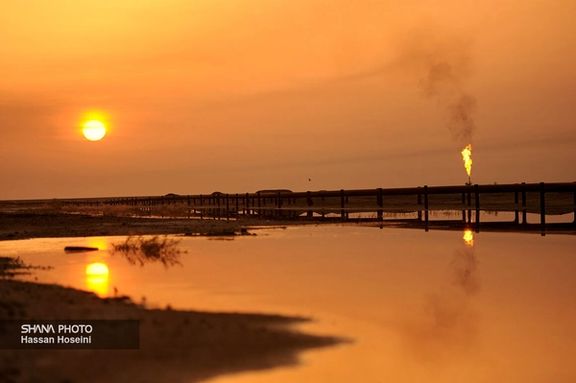
Representing the NIOC, the Petroleum Engineering and Development Company (PEDEC) is managing the project and the Tehran-based Dana Energy Company is in charge of developing the field, he was quoted by the oil ministry’s news agency Shana on April 28.
The field is estimated to hold 2 billion barrels of oil in place. According to Shana, the first stage of development operations is expected to help extract 30,000 barrels per day (bpd) from the field based on estimates, targeting cumulative production of 160 million barrels of crude oil over 20 years.
Discovered in 2012, the NIOC drilled the first exploration well, Sohrab-1, in the same year. A second exploration well followed in the southern part of the field in 2014.
In August 2021, Ahmadreza Lahijanzadeh, a deputy of the department of environment, said a Japanese company originally chosen to develop the field was prepared to carry out the project by using an advanced technology to avoid draining the marshes but the project was eventually given to a Chinese company that undertook to implement it at 20 percent cheaper but at the cost of drying the marshes.
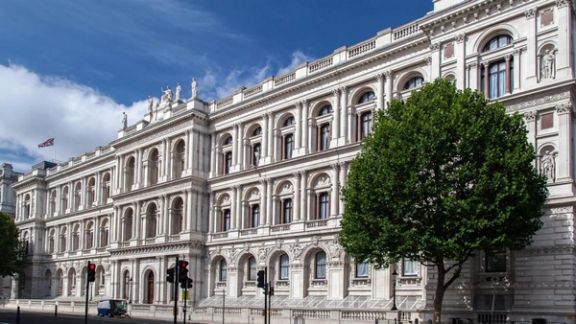
The British Foreign Office warned that British and Iranian-British citizens are significantly at risk of arbitrary detention if they travel to Iran.
The Foreign, Commonwealth and Development Office (FCDO) in a notice on Thursday advised British nationals against all travel to Iran.
It warned that the British passport can make Iranian authorities target travelers and they could spend months or years behind bars.
“Our ability to provide consular assistance is extremely limited. In an emergency – such as serious deterioration in the security situation – it is extremely unlikely the British government will be able to evacuate you or provide assistance on the ground in Iran,” reads the notice.
It also cautioned the British nationals, who are already resident in Iran, that they should carefully consider their presence and the risks they are taking by remaining.
There have been several high profile cases of British-Iranian dual nationals being arbitrarily detained in Iran and forced to serve long prison sentences as part of the country's strategy of hostage diplomacy.
“The criminal justice process followed in such cases falls below international standards. If you are detained in Iran your case will be in the hands of the Iranian authorities, who have shown a pattern of hostility towards the UK and its citizens,” added the Foreign Office.
The Iranian authorities have accused people with links to the UK of inciting protests, the Foreign Office warned saying that if the nationals are in or near a protest, they are at serious risk of arrest.
“Anyone who is arrested in connection with protests and holds British nationality may come under added suspicion of espionage or working to undermine the Iranian government.”